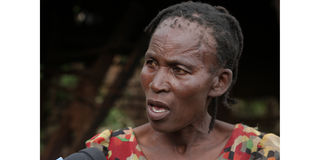Land dispute keeps a man's body in morgue for six years

Dinah Oribo during an interview with the Nation at their home in Iranya, Nyaribari Masaba in Kisii on April 26, 2022. The husband, Mzee Oribo Abuga is yet to be buried six years after his death over a court injunction that barred his burial at the ancestral home due to land tussle.
Mzee Oribo Abuga, from Iranya village in Nyaribari Masaba constituency, Kisii County, died six years ago. But his body has remained at the Nyamache Hospital mortuary all this while because a court injunction bars his burial at his ancestral home.
His family says they are unable to proceed with burial arrangements because someone is claiming their 2.5-acre property.
Mr Douglas Maisiba, 30, says his father died on May 24, 2017 after a long illness. But his spirit has not rested since, something that has denied them peace.
“He dropped dead just outside our house and we took him to the Nyamache Hospital mortuary, where his remains have been all this while,” he said.
“Just as is the norm here, we went to pick up his body for burial after a week of mourning, but we were shocked when the mortuary attendant told us we could not take it because they had been instructed not to release it.”
The 30-year-old boda boda rider said that after following up on the issue, they discovered that a family unknown to them and from a neighbouring clan had filed a case in the Kisii High Court, seeking to stop Mzee Abuga’s burial ostensibly because the land he was to be interred was theirs.
“In court proceedings, they said they had purchased the 2.5 acres. Well, we are aware that our father sold an acre of our land to a person known to us. This is not in dispute as we were all involved. The 2.5 acres that we call home is what is in dispute,” Mr Maisiba said.
He says they are distraught because they cannot bury him as their hands are tied by the court case.
“This case has been dragging on in court for six years. It was initially in the High Court, then it was moved to the magistrate’s court. In between the hearing, it was taken back to the High Court,” said Mr Maisiba, noting that they do not understand why the case is taking so long to be concluded.
He said he recently visited the Nyamache mortuary to check on the status of his father and was shocked to find just a skeleton.
“It is hurting. But we pray that this case comes to an end as soon as possible so that we can put our father’s remains to rest,” said Mr Maisiba, who says the disputed land is their ancestral home.
His mother Dinah Oribo is beside herself with grief. She appears to be an elderly woman of over 70 years despite being just 45.
The death of her husband and the fact that she cannot bury him has denied her peace and is causing health problems to her.
Depressed
She suffers depression and untold mental suffering as she ponders when she will lay to rest her husband’s remains.
She says Mr Maisiba, her firstborn son, has shouldered the burden of taking care of his four siblings.
“I sympathise with my son. Besides having a family of his own and struggling due to the little income he gets from his boda boda business, he has to support us. It is worse for me because he has to take me to hospital now and then for medication,” Mrs Oribo said.
She says life has been difficult for them and ‘rather unfair’ and she wants the matter to end.
“Several of my in-laws have died, but I cannot go to mourn with them because I am also mourning. According to our Kisii culture, you cannot mourn with others when you are also bereaved,” she said.
The family says they live in fear as they continue to receive threats.
“We have known no peace. We do not sleep at night as we fear for our lives. We have been receiving threats from time to time. But we cannot leave our ancestral home as we have nowhere else to go,” she said.
The mortuary bill has accrued to millions of shillings and they are unsure how they will settle it once the body is released to them.
“The mortuary charges Sh500 daily to preserve bodies. Six years is a long time,” Mrs Oribo said.
Land is an extremely emotive issue in Kisii. Police statistics indicate that at least 80 percent of the murder cases in Kisii are land-related.
As land cases continue to be reported, the population pressure that is threatening the community’s survival has not been addressed by successive political leaders in the region.
In many rural communities in Kisii, siblings share land that can be as little as 30x100. This explains why cases of land fraud have become the order of the day.
The 2019 census ranked Kisii seventh, with a population of 2.7 million. Land use indicates that farm size in the region is typically smallholding, ranging from 0.5 to 4.5 acres.





